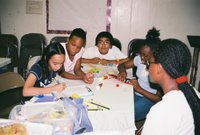I had a realization the other day. Quite often, I express my disdain for volunteers who want to come and "serve" our community. However, after thinking more about that, it dawned on me that I actually really like volunteers. We have some absolutely wonderful volunteers.
What I realized was that the expression of my disdain stems from two things:
1) The majority of volunteers want to "serve" on their terms. They will offer their time after 7:00 p.m. during the weekdays or on Saturdays or Sundays. Some even seem to get upset as if we should be appreciative of the time they offer and change our schedule so that we *can* have their volunteer services. Many volunteers explain exactly what they can and will offer, yet when we tell them what we need (i.e. homework help) they decline because it is not what they wanted to offer us. They come with their own solutions in mind without even asking what the problem is and without assuming that we might already have come up with a solution that we need help implementing.
It's almost like offering to volunteer is a way out. When we refuse what they have to offer, they are off the hook. They can then say they have offered and we won't accept it. It makes them look like the good guys. Volunteers and groups have offered Christmas gifts, winter coats, loads of bicycles, snacks for children, programs, etc.
I have said no to a number of these offers. I have had people leave very upset because we would not accept their "generosity." Our kids and families have too much to offer for them to be someone's "service project." If they were to get to know the people I know, they would realize how much someone has to offer. They would look longer term than a one-time Christmas gift that makes the giver feel more special than the receiver. If they got to know the people I know they would realize they have dreams, goals, and ambitions they are hoping to fulfill. One time neighborhood clean ups don't offer that. Offering one-time parties doesn't create partnerships that help them reach those goals.
One-time events offer off-brand bandaids (the ones that don't stick) to the pain and frustration. It doesn't help a teenager fill out a college application and then walk with them through the process year after year getting paperwork, financial aid, college loans, tutors, etc. It doesn't help a parent get the education needed to obtain a job that is meaningful to them. It doesn't help a child learn basic (and advanced) skills so that when he/she becomes an adult, he/she is academically prepared to enter into any field he/she chooses.
2) When people talk about wanting to get volunteers to help, 99% of the time they are talking about getting people from outside of the community where they serve. They don't even think about the capacity that already exists right inside the community.
Though many of the parents of the kids in our After-School Academy (ASA) are not formally educated, they are willing to learn. Through our staff development meetings, we bring in the highest quality college professors, school principals, etc. in order to help us understand best practices in education.
But even without the educational training the ASA offers, the parents are an invaluable resource. The parents who run our ASA have recruited a full roster of kids #1 because they believe in it and #2 because they are running it. The parents and others in the community bond together in a way that people outside of the community would not be aware of because it happens before or after hours--when outsiders to the community are usually in the comfort of their own homes.
(For a few examples: I learned the other day that Sylvia has started a "walking club" with a few of the parents. I hear her warning them that she is going to call them the next morning to get them up so they can walk. She said they have also attempted a pilates class. Wyshina has two kids of her own and knows her neighbor isn't really motivated to read to her own kids so Wyshina invites the kids to her house and they all get together and read books to each other. Keisha and Wyshina dispelled some community rumors and frustrations of parents who thought it was it was unfair to have to pay for an after-school program. When they explained the many opportunities we offer--like chess, golf, ballet, and other great opportunities--the parents became interested in enrolling their own kids. Chanel invited another parent's child over to play because the parent had expressed frustration with the unsupervised children her son was around. 6th graders who were formerly in the ASA are now classroom assistants and some are even helping teach classes.)We have a lot of volunteers and partnerships in our ASA. Only a few are from outside of the community. We are selective. We believe our community deserves to have people who are committed, passionate, and willing to get to know us, our needs, and our capacities. We do not need to be someone's one-time service project.
If you are interested in volunteering, we welcome you. But, if you are coming in from outside of the community, please think about what it would feel like if someone you didn't know knocked on your door then, when you answered, proceeded to tell you about some program you needed, without ever attempting to get to know you, your family, your needs, your wants, or your abilities.
If you are willing to get to know us, give me a call.
 This is a typical picture of Kashia. Offer her a challenge and her finger will go up to her chin in thinking mode. Her wheels will start turning and she will meet your challenge head on...usually surfacing with the answer.
This is a typical picture of Kashia. Offer her a challenge and her finger will go up to her chin in thinking mode. Her wheels will start turning and she will meet your challenge head on...usually surfacing with the answer. I love this picture with Kashia and her mom, Chanel. Though Chanel really dislikes pictures, I think this offers a great side of Chanel that shows you what kind of mom she is. When I asked Chanel if Kashia could be involved in our postcard campaign, Chanel was afraid they might interview her (she doesn't like talking much either) and take pictures of her, too. Instead of saying no, Chanel told me that she would do whatever she needed to for Kashia's sake.
I love this picture with Kashia and her mom, Chanel. Though Chanel really dislikes pictures, I think this offers a great side of Chanel that shows you what kind of mom she is. When I asked Chanel if Kashia could be involved in our postcard campaign, Chanel was afraid they might interview her (she doesn't like talking much either) and take pictures of her, too. Instead of saying no, Chanel told me that she would do whatever she needed to for Kashia's sake. Kashia is an inquisitive and precocious child. I wonder how many more inquisitive and precocious children we might have...and I wonder how much more Kashia could aspire to... if we offered the most vulnerable and dependent of our society a high quality education, good healthcare, a safe place to live, and the resources they need.
Kashia is an inquisitive and precocious child. I wonder how many more inquisitive and precocious children we might have...and I wonder how much more Kashia could aspire to... if we offered the most vulnerable and dependent of our society a high quality education, good healthcare, a safe place to live, and the resources they need.





